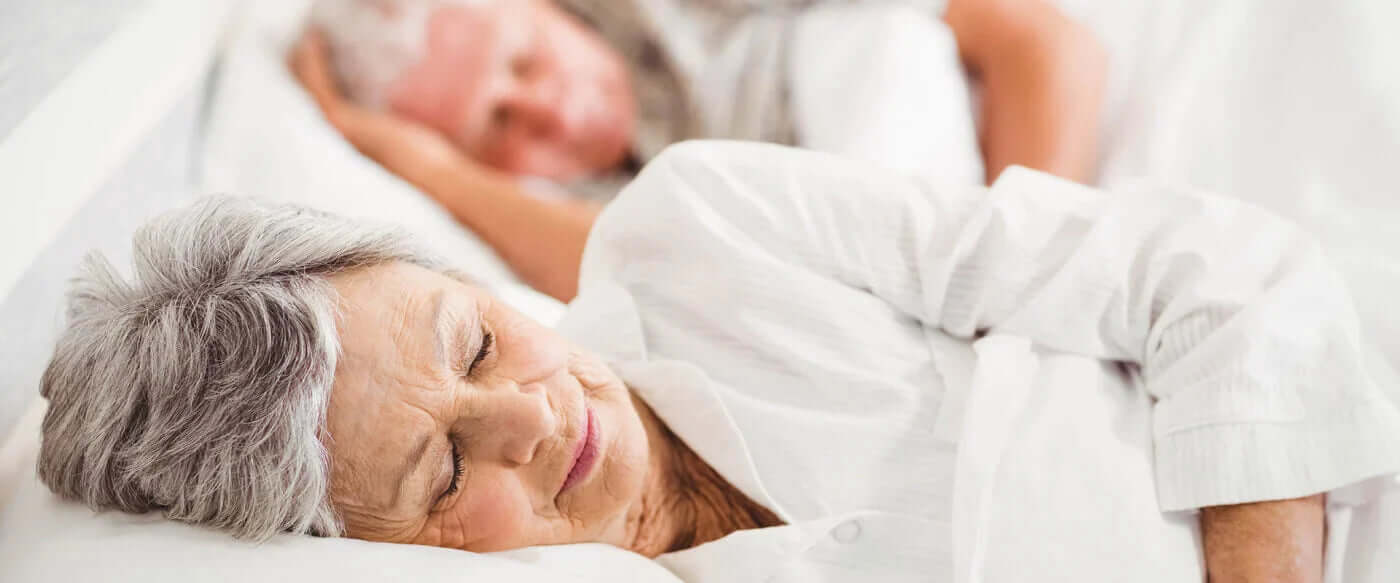We’ll discuss how sleep changes with aging as well as age-related health conditions that can affect sleep. We’ll give examples of what you can do to establish a steadier sleep schedule, and touch on when to see a doctor if you suspect a genuine sleep disorder.
Aging and Sleep Patterns
For those getting older, sleeping schedules transform from nighty marathons to shorter sprints. You’ll still need 7-9 total hours of sleep just as younger adults do, but they may be spread over 24 hours. This is a natural result of decreasing hormone production.
As you get older, your body produces lower levels of growth hormones and less melatonin. Melatonin is the natural hormone that your brain produces to make you sleepy in response to darkness. When darkness doesn’t make you sleepy, night sleep becomes more fragmented. You no longer go to sleep at the beginning of the night counting on a long, reliable, deep sleep before waking to daylight.
During the daylight hours, a reduction in growth hormones causes you to feel more tired during the day, resulting in the desire to go to bed earlier. The lack of melatonin makes you rise earlier, too. So where do you make up the sleep you’re missing?
Naps! Since light and dark matter less to their circadian rhythms, older bodies make up the proper amount of sleep by napping during the day. More napping increases your total time in bed. This leads to the perception of older people sleeping more. They don’t, and actually, older patients often feel as though they are sleeping less.
How Medical Conditions Affect Sleep
- Diabetes and prostate issues can mean frequent bathroom use, resulting in less sleep.
- Heart and kidney issues can make it very difficult and uncomfortable to lay flat, even if you’ve been a back sleeper all your life.
- Sleep apnea can develop later in life, particularly if it's due to excess weight and lack of muscle tone in the neck and airways. This can cause you to stop breathing periodically, leading to snoring, frequent waking, and gasping for air.
- Certain medications like antidepressants, beta-blockers, etc.
- Arthritis, osteoporosis, and chronic pain can wake you at any hour and wreck a good night’s sleep.
- Menopause and post-menopause hormonal imbalances can cause another layer of complication around sleep disturbance on top of the reduction of growth hormones and melatonin.
- Depression and anxiety often develop in older adults as a result of decreased mobility, the loss of loved ones, and/or lack of social engagement. These can all negatively impact sleep quality.
Practicing Good Sleep Hygiene
- One of the best things you can do to cultivate better sleep at any age is called sleep hygiene. Think of it as a research-backed bedtime routine to encourage your body’s ability to work through the stages of sleep.
- Keep your bedroom, dark, quiet, and cool.
- No screens in the bedroom. TV, cell phones, tablets, and other devices need to be put away or charged somewhere else at night.
- Whether or not you sleep the entire time, keep the same bedtime and wake-up time every day, even on weekends.
- Exercise at least 30 minutes a day to increase weariness, but never within 3 hours of bedtime. (Always consult your doctor before starting an exercise regimen!)
- Do your best to stay awake later in the day or keep your naps brief. Try to carry the sleepiness to your bedtime routine.
- No large meals, tobacco, alcohol, and stimulants (such as coffee and chocolate) late in the afternoon. It is especially important to steer clear of them the 3 hours before bedtime.
Tips to Achieve Better Sleep
If you can’t sleep for 30 minutes or longer, get out of bed and try reading a book - a real book, not a tablet. You can also walk around the house or write in a journal. Keep movements slow and calm, the point is to avoid worry, upset, and adrenaline. Go back to bed when you feel sleepy again.
Similar to writing in a journal, keep a sleep diary to share with your doctor. It helps them understand where the hurdles are in your sleep and wake cycles - and how they can help.
Only use sleep medicines as recommended by your doctor. Older people respond differently to over-the-counter sleeping pills and other sleep aids than younger people.
When to See a Doctor
Sleep deprivation is more acutely problematic than the sleep changes that come as you get older. If you or a loved one experience the following health issues leading to sleep deprivation, sleep cycle disruption, or excessive daytime sleepiness, you should contact a healthcare provider:
Movement disorders such as restless leg syndrome (RLS) and periodic limb movement disorder become more common as you age. Sleep cycle disruption from shaking or kicking yourself awake merits a discussion with your doctor, especially if it’s keeping you from getting to sleep in the first place.
Rapid Eye Movement behavior disorder is a condition where the neural pathways that keep you still while you sleep stop working. You begin moving and vocalizing your dreams. It is gradual, but does get worse with time and needs to be addressed with your healthcare team.
Sleep Apnea is another condition that requires a doctor’s care. If someone tells you that you snore loudly and/or you feel excessive daytime sleepiness, it’s important to be evaluated by a sleep specialist. Sleep apnea can lead to much more serious health problems like high blood pressure and heart disease which can cause heart failure. The good news is that it's fairly common in older adults and can be very well controlled through CPAP treatment.
Your quality of life matters! No age changes that. If you feel that you are truly having trouble sleeping, are not getting anywhere near enough sleep, or are experiencing a lower quality of life from a lack of REM sleep, seek help. Whether you are suffering from social isolation or an underlying health condition, your journey to better sleep starts with a call to your healthcare provider.
CANADA'S WIDE SELECTION OF CPAP MACHINES, CPAP MASKS & CPAP ACCESSORIES
No matter where you are in your sleep apnea journey, The CPAP King has you covered. If you are looking for brand-new equipment and CPAP machines at the lowest price, you're definitely at the right place. We offer you the top-recommended brands for CPAP Machines, CPAP Pillow Masks, Nasal Masks, Full Face Masks, CPAP Supplies, and Sleep Accessories at a fraction of the price. Order now and take advantage of free shipping and no-hassle return policies across Canada. You don't need to break your wallet to get the sleep you deserve!
Do you have questions? Call us toll-free at 866-476-4821 or start chatting now with one of our CPAP experts today.



Share:
Why renewing your CPAP Machine and CPAP equipment is important to treat your symptoms of sleep apnea
What Is The Difference Between A BiPAP Or Bi-Level Machine?